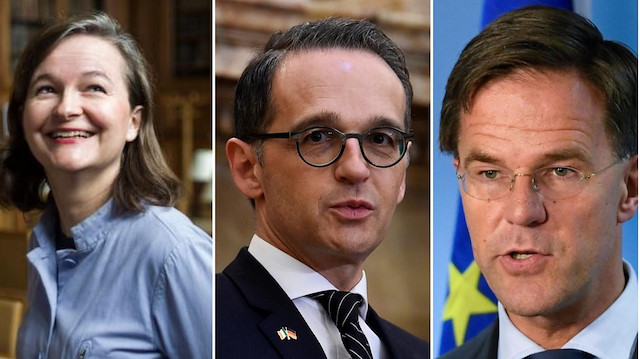
With the clock ticking ahead of Britain's scheduled exit from the European Union at the end of March, politicians in EU have started evaluating the situation and are urging the UK government to reach a solution.
Dutch Prime Minister Mark Rutte warned on Wednesday that time is running out to reach a deal before Britain leaves the European Union and urged the British to make up their minds.
"It is now up to the British to indicate what they want," he told reporters in The Hague in reaction to Tuesday's vote against Prime Minister Theresa May's Brexit deal. "We have a little bit more time, but it is really going down to the wire."
"We still hope to reach an agreement before they leave at the end of March," Rutte said.
The Netherlands, one of the world's leading exporters, with close ties to the British economy, is highly vulnerable to international trade fluctuations.
"A no-deal exit is of course worse than with a deal. What the Netherlands is doing is trying to ensure that the damage is minimised," Rutte said.
He added that Britain's firm demands about how it leaves the 28-member EU meant that "this is the only deal possible at the moment".
"If they were to move on those demands we could try to reach another agreement, but unless that happens this is the only option," the Dutch premier said.

Britain's parties must rise above their own interests and cooperate on a Brexit solution they all support, the European Parliament's Brexitnegotiator Guy Verhofstadt said on Wednesday, adding the EU would then be ready to engage with London on a new agreement.
Verhofstadt told the European Parliament a day after the British parliament decisively rejected the withdrawal deal agreed with the EU that to achieve that, Britain should change its "red lines" it set out in negotiations.

The Northern Irish party that props up British Prime Minister Theresa May's minority government does not believe an extension of the period which Britain has to leave the European Union is necessary, Democratic Unionist Party Nigel Dodds said on Wednesday.
"I don't think (an extension of Article 50) is inevitable, and it's not in my view necessary because the EU can act when it wants to (...) I think it can be done and remember, on the (Irish) backstop, people want to see that we are not trapped into it," Dodds told the BBC.
The European Union is ready to discuss a different deal on Britain exiting the bloc if London changes its existing "red lines", but a safeguard preventing a physical border on the island of Ireland would have to stay, the EU's chief negotiator said on Wednesday.
Michel Barnier told the European Parliament that the risk of a no-deal Brexit was now higher than ever after the British parliament decisively rejected on Tuesday the withdrawal agreement negotiated with the EU by Prime Minister Theresa May.

German Foreign Minister Heiko Maas said on Wednesday the "time for playing games" was over after London's rejection of a withdrawal agreement.
Maas said further talks would almost certainly be needed after Britain's parliament voted down the exit deal worked out between London and the bloc over the past two years.
"The time for playing games is over," Maas told Deutschlandfunk radio, adding that the EU would deal "constructively" with any British request to delay the departure date.
German economy minister Peter Altmaier said that the EU would look at any fresh proposals London made, but said the substance of the deal was non-negotiable.
But umbrella groups representing German industry, whose cross-border supply chains stand to be hit by the imposition of a hard customs border between Britain and the continent, were less conciliatory.
Martin Wansleben, head of the German Chambers of Commerce, warned that the political uncertainty now made planning almost impossible and that German companies were already starting to build inventory in preparation.
German auto makers would start asking whether it was worth investing in Britain, he added.
"The House of Commons has missed an opportunity to avert a hard Brexit and lay the foundations for close ties to the EU," said Carl Martin Weicker, head of machine tools association VDMA.
"It is simply irresponsible that the British governing coalition is still trying to reach a unified position 10 weeks before the exit deadline," he added.

A second Brexit referendum is just "hypothesis" for now, said French European Affairs Minister Nathalie Loiseau, addressing speculation after Britain's parliament rejected British Prime Minister Theresa May's Brexit deal.
"For the moment this is just hypothesis," Loiseau told France Inter radio on Wednesday.
Loiseau said neither May nor Labour's opposition leader Jeremy Corbyn had spoken out strongly in favour of a second referendum.

British Prime Minister Theresa May seems unclear as to what happens next on Britain's exit from the European Union after a major defeat on the issue in parliament on Tuesday, Scotland's First Minister Nicola Sturgeon said on Wednesday.
"(May) doesn't seem to have any clear idea herself of what the next steps are and ... it didn't seem to me that she is prepared to abandon or move any of her red lines in order to open space for any new ideas," Sturgeon said, summarising a phone call with May on Tuesday night.
"As a minimum right now we need to be looking at an extension of article 50," she told the BBC in London.














